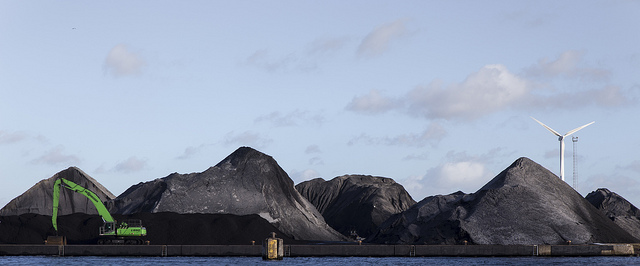It’s official: more money was invested in renewables and more generation capacity added in 2015 than ever before. Conventional wisdom has always been that low fossil fuel prices would make renewables uncompetitive even as the cost of renewable energy continues to drop. In that view, fossil fuel prices drive investments in renewables. It’s not happening, however, so maybe it’s time to consider the reverse paradigm: renewables driving fossil fuel prices. Craig Morris investigates.

Coal prices are at rock bottom, and coal companies have been hurt badly. (Photo by Marcel Oosterwijk, modified, CC BY-SA 2.0)
What a year 2015 was – for fossil fuels! Goldman Sachs coined the term “peak coal,” for instance. Whereas peak oil means oil production cannot be ramped up further, peak coal means demand will drop. China in particular is reducing its coal consumption, which largely impacts coal imports to the country (it continues to consume domestic coal).

As a result, coal prices are at rock bottom, and coal companies have been hurt badly. For instance, the share price of Peabody Energy, the largest coal company in the world, dropped by 90 percent between December 2014 and December 2015. One cause is the global divestment movement. In 2014, 0.05 trillion USD in divestment from fossil fuel resources had been pledged. At the climate conference in Paris, the number rose to 3.4 trillion.
Conventional wisdom has it that low fossil fuel prices will increase demand for fossil fuel – and decrease investments in renewables. The details, however, are a bit messier. Most renewable investments pertain to wind and solar power, and hence to electricity. Oil prices do not impact those investments much because so little oil – just a few percentage points worldwide – is used for power generation. Low oil prices will therefore mainly disincentivize biofuels for transportation and renewable heat options (solar thermal, biomass, heat pumps, etc.).
Coal and natural gas are different. They are both widely used in the power sector. With coal prices down a third in the past two years and natural gas prices so low that US shale gas firms are going bust, demand should be turning away from renewables and towards coal and gas. It isn’t. Why not?
Flashback time! In 2011 I said clean energy would cap oil prices, and Claude Mandil, former IEA head, laughed. In 2015, Saudi “got” solar.
— Michael Liebreich (@MLiebreich) June 4, 2015
Caption: Bloomberg New Energy Finance’s Michael Liebreich has been arguing for several years now that renewables would keep down fossil fuel prices.
Maybe it’s time we started thinking of renewables as a driver of fossil fuel demand – instead of the other way around. Countries around the world have varying fuel costs, especially for natural gas, which can be several times more expensive in Japan than it is in the US. Americans were therefore hoping to set up liquefied natural gas terminals to export gas to Asia. The problem was that the shale gas boom largely took place towards the East, so Californians themselves had a hard time benefiting from the country’s shale gas boom. A lot of infrastructure needed building, and that took time. Now, it seems that low prices came before the infrastructure could be built.
From the investor’s perspective, the problem is therefore the volatility of fossil fuel prices. It’s risky. And the assets need to remain in operation for decades to be profitable. Compare that to wind farms and solar arrays, where around 95 to 99 percent, respectively, of the total cost over 20 years is known on day one. Renewable energy investments are much less risky.
Governments also have their reasons to go renewable. The Chinese can’t breathe. Nor can the Parisians and Italian urbanites. In European cities, the problem is clearly diesel vehicles, whereas the Chinese suffer from both coal and oil pollution. Governments are therefore clamping down on coal and oil.
Theoretically, demand for oil in the heat sector should rise. In Germany, heating oil is currently 27 percent cheaper than wood pellets, for instance (source in German). Nonetheless, oil consumption in the German heating sector is unlikely to increase because the German government practically banned oil-fired heaters in new buildings and renovations this year; instead, renewable heat is required.
So the growth of renewable energy is likely to limit demand for fossil fuel and eventually reduce it, which will keep down the prices for coal, oil, and natural gas. Until recently, low fossil fuel prices would have been expected to slow down the transition to renewables – according to conventional wisdom. But maybe, just maybe, renewables are now in the driver’s seat.
Craig Morris (@PPchef) is the lead author of German Energy Transition. He directs Petite Planète and writes every workday for Renewables International.
Driving … 🙂
https://translate.google.ie/translate?sl=sv&tl=en&js=y&prev=_t&hl=en&ie=UTF-8&u=http%3A%2F%2Fwww.svd.se%2Fvattenfalls-osaljbara-trabant&edit-text=
Just out in Germany: Vattenfall – Europe’s largest lignite burner – suggests to close the lignite mines in Germany.
They can’t be sold.
http://www.sz-online.de/nachrichten/braunkohle-zieht-vattenfall-noch-tiefer-in-die-krise-3315060.html
Machine translation:
https://translate.google.ie/translate?sl=de&tl=en&js=y&prev=_t&hl=en&ie=UTF-8&u=http%3A%2F%2Fwww.sz-online.de%2Fnachrichten%2Fbraunkohle-zieht-vattenfall-noch-tiefer-in-die-krise-3315060.html&edit-text=
Vattenfall has already ceased to pay taxes to the mining areas, they even want back the taxes they paid in 2015:
(in German)
http://www.mdr.de/sachsen/bautzen/vattenfall-gewerbesteuer-lausitz-100.html
and the machine translates:
https://translate.google.ie/translate?sl=de&tl=en&js=y&prev=_t&hl=en&ie=UTF-8&u=http%3A%2F%2Fwww.mdr.de%2Fsachsen%2Fbautzen%2Fvattenfall-gewerbesteuer-lausitz-100.html&edit-text=
———————————
EdF – the French atom power company who was to build Hinkley Point C in the UK – is so badly down that they have to give up all new power plant ideas. The REs have captured the power prices:
http://af.reuters.com/article/commoditiesNews/idAFP6N10I01H
Poland’s coal industry blamed until recently German wind power undermining their business concept.
But now look at that,Poland is already on the 6th place in Europe:
http://www.platts.com/latest-news/electric-power/brussels/record-eur264-billion-invested-in-new-eu-wind-26363154
SocGen published a price forecast:
http://www.platts.com/latest-news/electric-power/london/socgen-cuts-european-power-price-forecasts-20-26364442
The conclusion that a massive generator closure would help seems to be wishful thinking, Germany will close about 8 GW atom power and 3-4 GW lignite until 2022.
But look at the prices:
http://www.eex.com/de/marktdaten/strom/futures/phelix-futures#!/2016/02/10
Any bets taken for the first base load future price going below € 20.-/MWh ?
Will it be this week or next week?
—————
My conspirative sources tell me that the Belgian bangers are back in production to cause a European Fukushima with plenty of compensation for EdF who then would – for political reasons only – close all atom generators 😉
http://www.reuters.com/article/us-edf-nuclear-idUSKCN0VJ0ML
Czech owner of German lignite mines and power plants: difficulties with wind and sunshine
The company Mibrag is cutting jobs and reducing lignite output/combustion by about 10%.
They blame sun and wind dumping power prices (in German):
http://www.naumburger-tageblatt.de/mitteldeutschland/jobabbau-im-tagebau-mibrag-will-bis-zu-300-stellen-streichen-23703738
The German Handelsblatt reports difficulties for the Swedish state’s lignite business in Germany as well, the sale of the entire sector might not be possible.
(in German and with a pay-wall)
http://www.handelsblatt.com/my/unternehmen/industrie/ostdeutsche-braunkohle-vattenfall-findet-keinen-kaeufer/13305732.html?nlayer=Organisation_11804700
As Greenpeace said last year – every new owner wants to be paid from Vattenfall to carry the burden.
So maybe Greenpeace could be allowed back into the bidder’s club?
German lignite assets now worthless:
https://global.handelsblatt.com/breaking/exclusive-swedish-utility-vattenfall-struggling-to-sell-german-lignite-business
http://www.reuters.com/article/us-vattenfall-germany-lignite-idUSKCN0WD0T8
Just out: CEZ opts out from Eastern-German lignite bidding process
http://af.reuters.com/article/energyOilNews/idAFP7N15B009
Only 3 bidders are left so far, one of them (Steag) wants to close down the lignite business anyhow (Stiftungsmodell).
Greenpeace’s offer of 2 billion Euros (payment to Greenpeace to close the lignite assets) was serious, all other remaining bidders have the same number in mind:
http://www.wsj.com/articles/vattenfall-likely-to-need-to-spend-billions-to-sell-german-coal-fired-power-plants-1458038991#livefyre-comment
As Minister for Economy Gabriel said 2 years ago: just look into their books.
Now greed has finished the Swedish atom duds, they couldn’t get enough.
Peak oil also means demand will drop, actually